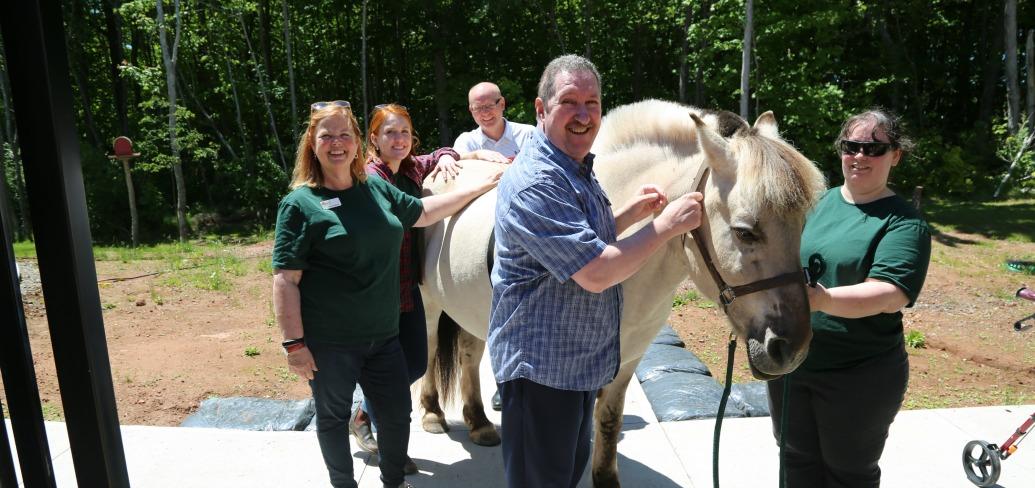Billy (the horse) offers unique palliative care support

As a regular at the Charlottetown Driving Park, Kerry McKenna grew up loving the excitement of harness racing.
Now 58, the Charlottetown resident still loves horses – but enjoys them at a slightly slower pace. McKenna is living with brain cancer and is a day-patient at the Provincial Palliative Care Facility in Charlottetown, where every week he is visited by Billy, a Norwegian Fjord horse. Patients like Kerry at the Palliative Care Centre get “equine-assisted therapy” through a program provided by Dr. Mary McNiven of the Atlantic Veterinary College (AVC).
“The highlight of seeing Billy was that he made me feel relaxed and calm which takes my mind off having brain cancer,” McKenna said after spending time with the 16-year-old horse in the sunshine outside the centre. “Everything is so peaceful here, it’s a great thing they’re able to provide."
Equine-assisted therapy has become more common with trauma clients, but palliative patients have also unique worries and concerns, says Billy’s owner, AVC professor Dr. Mary McNiven. Billy visits patients and family through their windows, in the courtyard, or in the parking lot of the centre. Because of the design of the centre, patients can see Billy at the window of their rooms from their beds.
“Horses give the patients something to think about and to talk about with family and staff. Here – where you’re really living in the moment – that’s important,” McNiven said. “It’s a positive focus and gives them an opportunity to talk about their own animals."
The research project examines the effect of the visits on both the patient and the therapy animal. While registered nurse Krisandra Cairns, a Master of Nursing graduate student, is in charge of the patient side of the project, Justine MacPherson, a second-year DVM student, is studying the effects of the visits on the welfare of the horse. Both students are supervised by Dr. McNiven.
MacPherson closely monitors Billy’s heart rate with a monitor attached to his halter for signs of stress. He wears the monitor for 10 minutes in his stall before leaving the farm, in the trailer en route, during the visit, in the trailer home, and back in his stall. MacPherson will present the results of her study at a research symposium at AVC in August. Cairns interviews participating patients and administers a health assessment before and after Billy’s visits; her results will be included in her Master of Nursing thesis later this year at UNB.
Palliative care includes supports to help patients and their families understand their illness and treatment options, manage pain and symptoms, respite care, emotional support, and more. It’s about being there for people at a time when they need it the most.
Five years ago doctors told McKenna he had between three and five years to live. These days, he enjoys his daytime visits to the centre, talking to patients and staff, reminiscing, and telling stories of his life.
“I find they’re so kind and helpful to me, everyone is very considerate,” he said. “I like being able to talk to other patients and see what they’re going through. It makes my day brighter to be able to talk to somebody, have a game of crokinole.”
In recent years the Prince Edward Island government has made significant investments in palliative care, from advances in pain management to the new $5.6 million stand-alone provincial Palliative Care Centre that opened in 2015.
“Investments such as this have resulted in Prince Edward Island developing one of the most comprehensive palliative care programs in Canada,” said Health and Wellness Minister Robert Mitchell.
Located on Murchison Drive, the palliative care centre offers a 10-bed palliative care unit, a day program, and outpatient clinic in development. The Provincial Integrated Palliative Care Program also offers supports for patients who wish to remain in their own homes, with services are provided through a partnership with PEI Home Care.